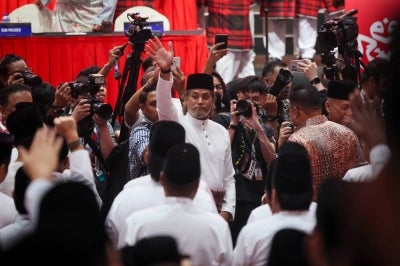Why care about designated areas for smokers?
HAFIZA HASAN
The issue of smoking is once again a topic of public discussion as the government plans to provide designated smoking areas, especially for food premises in confined areas.
Although it was just a proposal, it has elicited various reactions from the public. For smokers, they would undoubtedly agree with the Health Ministry's suggestion. It would make it easier for them to smoke after having a meal.
However, for non-smokers, such a proposal was undoubtedly irksome.
From another perspective, we also wondered what has happened to the 'No Smoking' campaign initiated by the government long ago in an effort to reduce the culture of smoking among Malaysians?
The government should firmly adhere to the principle of 'saying no to smoking' rather than posing the question 'where can we smoke.'
Providing designated areas was like catering to smokers' desires to freely puff and exhale 'enjoyable smoke' anywhere, while non-smokers will continue to be victims of inhaling the foul smell of cigarette smoke from others.
Statistics showed that there were approximately five million Malaysians aged 15 and above who smoked.
This was revealed by former Health Minister Dr Zaliha Mustafa in November, last year, who also predicted that the number of new smokers would continue to increase due to the emergence of electronic cigarettes or vapes.
She also revealed that a national health and morbidity survey found that the number of smokers among those as young as 15 years old doubled to 1.2 million in 2019 compared to 600,000 smokers in 2016.
This was something of great concern.
With vapes hanging around their necks, pods in their hands almost all the time, perhaps what the government desired was to be fair to smokers, but it needed to be reconsidered.
In 2018, Datuk Seri Dr Dzulkefly Ahmad who was also the Health Minister then introduced smoking area regulations with a distance of three metres from food premises.
This writer still remembers that at that time, there were many complaints about the matter and the 'netizen department' also provided various arguments and comments, including those who agreed with the idea, which was described as the beginning of a healthier air in the country.
Then, the Housing and Local Government Ministry took the initiative to build designated smoking areas in public places with an allocation of RM1 million given to local authorities (PBT).
This drew criticisms from the Malaysian Tobacco Control Council which claimed that the action would only encourage smokers to gather in groups.
What is the best initiative? Allowing conditional smoking or banning it altogether?
Surely the second option was better. However, its implementation was not as easy as imagined and required high commitment.
There needs to be a determination to ensure it was achieved, as shared by the Malaysian Muslim Restaurant Owners Association (Presma), which wanted the smoking ban to be maintained without any u-turns being made.
Restaurant owners may incur losses because customers will flee to places where smoking was easier. However, morally, such restaurants have helped the country ensure the safety of the younger generation from the habit of smoking.
Although the proposal to create designated smoking areas in premises was not finalised yet, such a suggestion should not come from the Health Ministry.
It is better to just maintain the smoking ban in food premises while at the same time enhancing enforcement to ensure that the regulations were complied with by everyone.
If the government continued to prioritise the welfare of smokers, all efforts made so far to educate the public about the risks of smoking would be futile.
Nurhafiza Hasan is an editor at Sinar Harian.
Download Sinar Daily application.Click Here!














